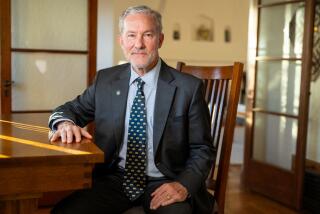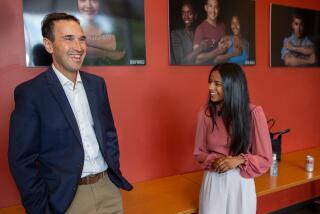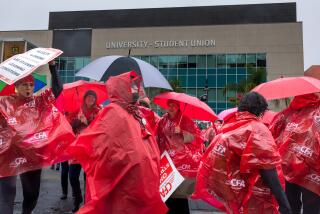Regents name new UC San Francisco leader, approve chancellor pay raises
The UC regents Thursday confirmed UC San Francisco’s medical school dean, Sam Hawgood, as chancellor of that health sciences campus and set his new salary at $750,000, a 13.8% increase. The regents also approved 3% pay raises for other UC chancellors and some top administrators.
Hawgood, an Australian-born expert in neonatal lung therapies, has served as interim chancellor of UC San Francisco since Susan Desmond-Hellmann left to become chief executive officer of the Bill & Melinda Gates Foundation.
Hawgood has been in various research and administrative jobs at UC San Francisco for 32 years and beat more than 300 outside candidates for the chancellorship, officials said.
Desmond-Hellmann’s base salary as chancellor was $450,000, but as medical school dean Hawgood already was paid much more than his former boss. Under the regents’ new arrangement for Hawgood, $500,000 of his base salary will come from state funds and $250,000 from a newly endowed faculty chair to be financed by donations to the campus foundation.
In addition, the regents gave 3% raises to the nine other UC chancellors and 11 other highly compensated executives, including some senior vice presidents and medical center directors. Many have not had salary increases for seven years and regents said that UC has become uncompetitive with rival institutions as it searches for top talent.
Faculty and non-unionized staff were given 3% raises this year and many unionized employees received more, although all had to increase contributions to pension funds.
The new executive salary levels range from $319,300 a year for UC Merced Chancellor Dorothy Leland and UC Santa Cruz Chancellor George Blumenthal to $927,009 for UCLA hospital system executive David Feinberg and $963,050 for UC San Francisco Medical Center chief executive Mark Laret.
The new salaries for the other seven chancellors are: $324,450 for UC Santa Barbara’s Henry Yang; $364,620 for UC Riverside’s Kim Wilcox; $367,071 for UC Irvine’s interim chancellor Howard Gillman; $412,000 for UC Davis’ Linda Katehi; $423,417 for UC San Diego’s Pradeep Khosla; $428,480 for UCLA’s Gene Block; $501,404 for UC Berkeley’s Nicholas Dirks.
On top of that, chancellors receive housing or housing allowances. Medical center leaders are eligible for bonuses based on financial performance and health statistics at hospitals.
UC system President Janet Napolitano described the raises as “minimal” and fair, given the long stretch of frozen salaries and the higher compensation that she said other top-ranked research universities offer.
Gov. Jerry Brown, who is a regent, did not attend Thursday’s meeting. In the past he has criticized pay raises for UC and Cal State executives. His office said the governor was not available to comment about the regents’ action.
UC San Francisco, a $4-billion annual operation, conducts large amounts of federally funded scientific research and runs vast medical centers along with medical, dental, nursing and pharmacy schools. The campus enrolls no undergraduates, but has about 5,600 students, residents and postdoctoral fellows in graduate and professional programs.
In the selection process, Hawgood “demonstrated the intellectual inquisitiveness, leadership acumen and powerful vision we seek in our chancellors,” Napolitano said Thursday.
Hawgood, 61, told regents that his campus faces challenges in hospital costs, new technologies and the high debt load of medical students, among other things. Although he promised to preserve core values of research and patient care, he said the school “must be neither nostalgic about the past nor complacent about the present.”
In other business, the regents approved a memorial resolution honoring the six UC Santa Barbara students killed on May 23 during the murderous rampage of a mentally ill young man who then committed suicide. The motion declared that the entire UC system wants to “comfort all those who have been grievously touched by one of the most devastating moments in the University’s long history.”
Twitter: @LarryGordonLAT
More to Read
Start your day right
Sign up for Essential California for news, features and recommendations from the L.A. Times and beyond in your inbox six days a week.
You may occasionally receive promotional content from the Los Angeles Times.







